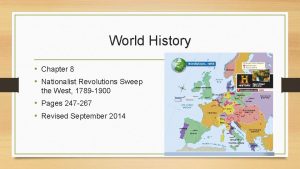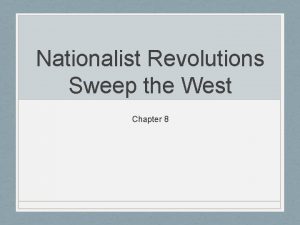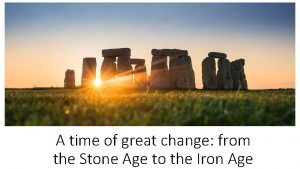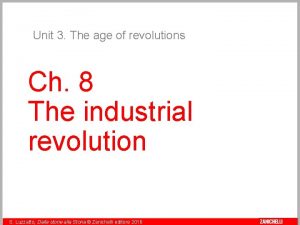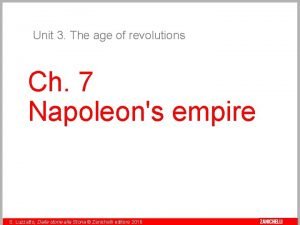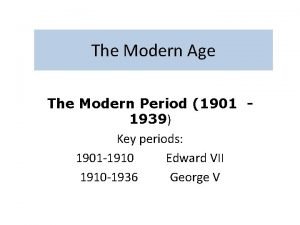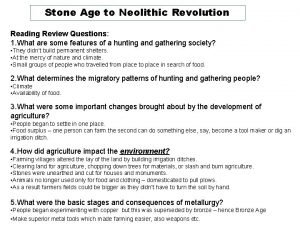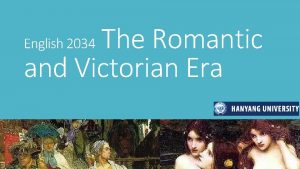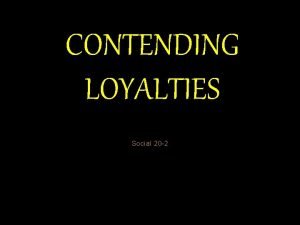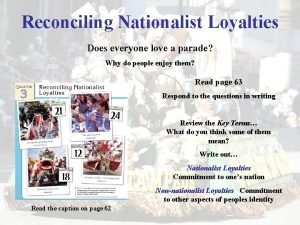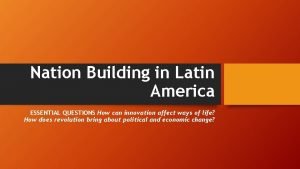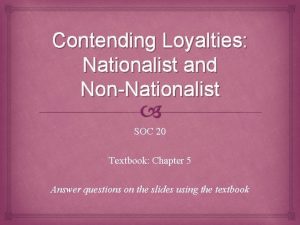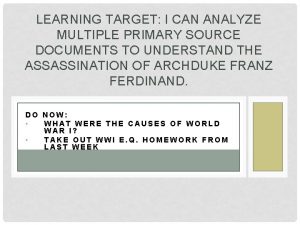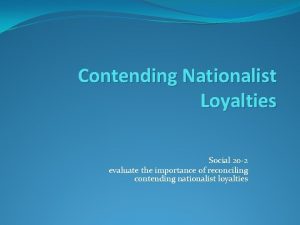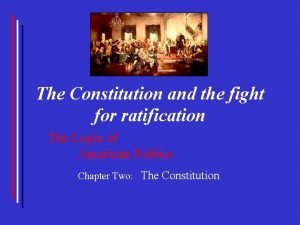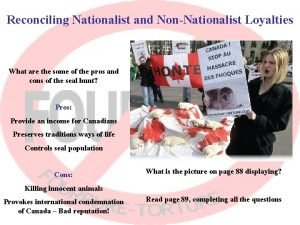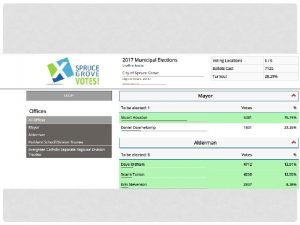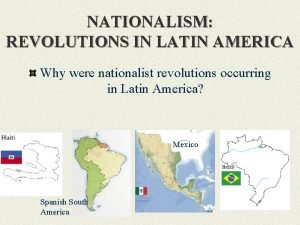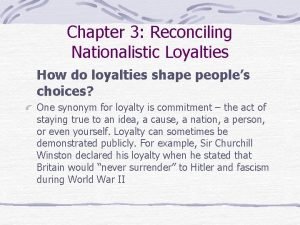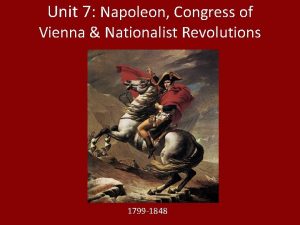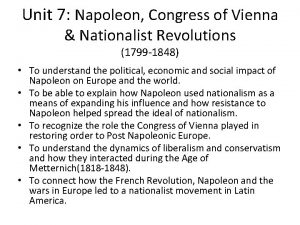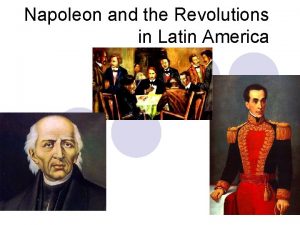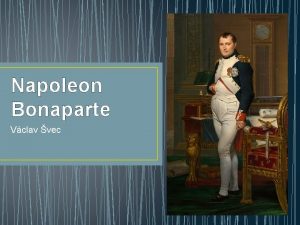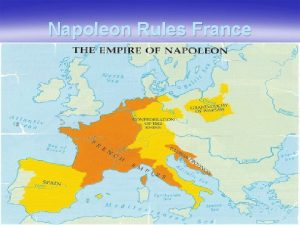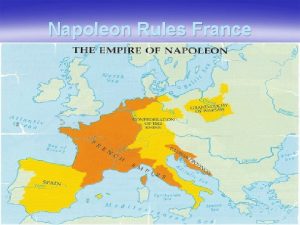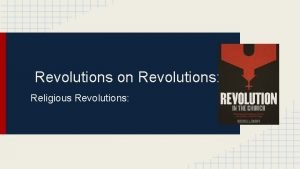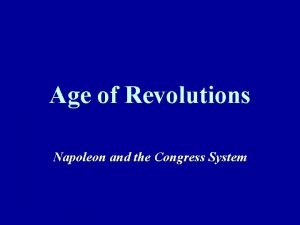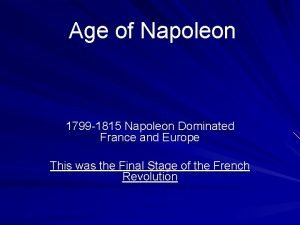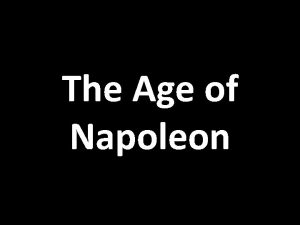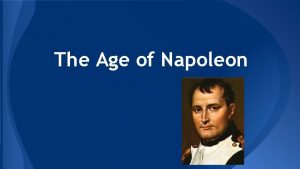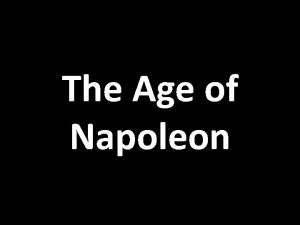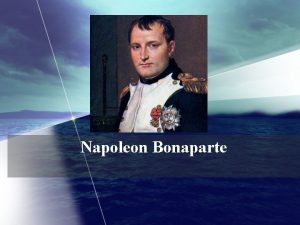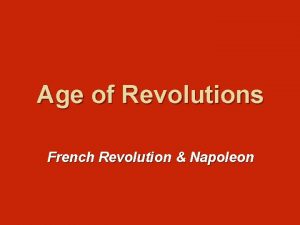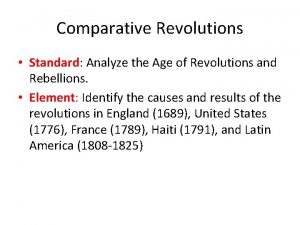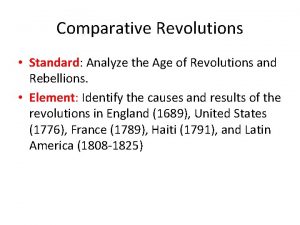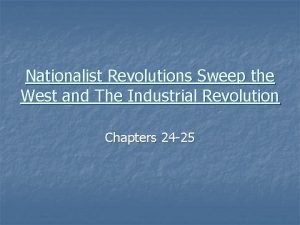The Age of Napoleon and the Nationalist Revolutions






















- Slides: 22

The Age of Napoleon and the Nationalist Revolutions

After the Battle of Waterloo, diplomats and heads of state at the. Congress of Viennaredrew the map of Europe. Congress of Vienna– a meeting of heads of state within Europe after Napoleons defeat at the Battle of Waterlooto restore stability and order in Europe Their chief goal was to create a lasting peace while preserving the old order. They wanted to: • Create a balance of power among countries to prevent wars • Protect the system of monarchy, reinstating kings in many countries of Europe

A Shift in Power Balance Is Lost • In 1815 the Congress of Vienna established five powers in Europe: Austria, Prussia, Britain, France, and Russia • By 1871, Britain and Prussia (now Germany) have gained much power • Austria and Russia are weaker militarily and economically

How did conservatives clash with liberals and nationalists after 1815? At the Congress of Vienna, the powers of Europe tried to uproot the “revolutionary seed” and suppress nationalist fervor. Others, however, challenged the order imposed in 1815. The clash of people with opposing ideologies plunged Europe into more than 30 years of turmoil. ideology– a system of thought and belief

Europe Faces Revolutions Liberal and nationalist uprisings challenge the old conservative order of Europe. Clash of Philosophies Three Philosophies • In early 1800 s, three schools of political thought conflict in Europe • Conservative—landowners, nobles want traditional monarchies • Liberal—wealthy merchants, business owners want limited democracy • Radical—believe in liberty, equality; want everyone to have a vote

Liberals wanted governments based on written constitutions. They opposed: • Divine-right monarchies • The old aristocracy • Established churches They saw the role of government as protecting the individual’s freedom of thought, speech, and religion.

Nationalism Develops Nationalism and Nation-States • Nationalism—loyalty to nation of people with common culture, history • Nation-state—nation with its own independent government • In 1815 Europe, only France, England, and Spain are nation-states • Liberals and radicals support nationalism; conservatives do not

Latin American Peoples Win Independence Spurred by discontent and Enlightenment ideas, peoples in Latin America fight colonial rule and promote Nationalism. Colonial Society Divided A Race and Class System • Latin America has social classes that determine jobs and authority: • Peninsulares—born in Spain, they head colonial government, society • Creoles—American-born Spaniards who can become army officers • Mestizos have both European and Indian ancestry • Mulattos—Have both European and African ancestry • Slaves, Indians are at the bottom of society

Revolutions in the Americas Revolution in Haiti • Haiti is first Latin American territory to gain freedom • Toussaint L’Ouverture leads slave revolt against the French (1791) • Toussaint eventually dies in French prison 1803 Haiti’s Independence • Jean-Jacques Dessalines declares Saint Domingo a country in 1804 • Saint Domingo becomes first black colony to win independence • Renamed Haiti, means “mountainous land” in the Arawak language

Creoles Lead Independence The Spread of Enlightenment Ideas • Enlightenment ideas inspire Latin American revolutionaries Creole Leaders • Simón Bolívar—wealthy Creole leads Venezuela in revolution • José de San Martín—leader of Argentinean revolutionary forces Bolívar’s Route to Victory • Venezuela declares independence in 1811; Bolívar wins war by 1821 San Martín Leads Southern Liberation Forces • Argentina independent in 1816; San Martín helps free Chile • Simon Bolívar’s and San Martín’s armies drive Spanish out of Peru in 1824

Italy becomes a Unified country Nationalism is the belief that each ethnic group should have its own national state and government. For centuries, Italy had consisted of smaller states. Italians wanted unification.

In 1852, Count Cavour became the Prime Minister of the Kingdom of Piedmont and Sardinia in Northern Italy. With French help, Cavour drove the Austrians out of Northern Italy after a war in 1859. E. Napp

The nationalist leader, Giuseppe Garibaldi, overthrew the king of Naples in the south. He then joined Naples to Cavour’s enlarged Piedmont.

With Garbaldi and Cavour leading the unification charge by 1860, Italy had become a united Kingdom when the Italian king in Rome and the Pope agreed to give up their power and create a unified Italian country.

German Unification Following the Congress of Vienna, 39 German States formed the German Confederation. Austria and Prussia dominated the Confederation.

Prussia was one of the largest German states. Its Prime Minister, Otto von Bismarck, used skillful diplomacy and Prussian military power to achieve German unification. E. Napp

LEADER OF GERMAN UNIFICATION Bismarck: ◦ Realpolitik (“the politics of reality”): politics than leave no room for idealism. ◦ Known as the “Iron Chancellor” for his realpolitik and his powerful rule. He came to power by using “blood and iron”as well as unique controversial political means.

STEPS TO GERMAN UNIFICATION 1870 -1871: The Franco-Prussian War

STEPS TO GERMAN UNIFICATION 1870 -1871: The Franco-Prussian War. ◦ By 1867, a few southern German states remained independent of Prussia. Bismarck felt he could win the support of the Southern countries to his cause if they faced a threat from outside: a war with France would rally the South. ◦ He published an altered version of a diplomatic telegram he had received from France (Ems telegram). Reacting to the insult, France declared war on Prussia on July 19, 1870. As a result of the war and the Prussian victory over France, the remaining South Germany countries joined Bismarck and his cause for Unification.

STEPS TO GERMAN UNIFICATION Over a six-year period, Bismarck created a united Germany. He made skillful use of diplomacy and warfare to accomplish this task.

Germany achieved unification in 1871. The Prussian king became the Kaiser (emperor) of all Germany.

THE BALANCE OF POWER SHIFTS The Congress of Vienna established five Great Powers in Europe: Britain, France, Austria, Prussia and Russia. By 1871, however, Britain and Germany were clearly the most powerful. The European balance of power had broken down. This uneasiness would lead up to the showdown that was World War 1.
 Chapter 8 nationalist revolutions sweep the west
Chapter 8 nationalist revolutions sweep the west Which ideas of romanticism would encourage nationalism
Which ideas of romanticism would encourage nationalism Nationalist revolutions sweep the west
Nationalist revolutions sweep the west Stone age, bronze age iron age timeline
Stone age, bronze age iron age timeline Iron age bronze age stone age timeline
Iron age bronze age stone age timeline Zanichelli
Zanichelli An age of revolutions zanichelli
An age of revolutions zanichelli Victorian age and modern age
Victorian age and modern age Difference between stone age and modern age
Difference between stone age and modern age Victorian period in english literature
Victorian period in english literature Nationalist position definition
Nationalist position definition Example of contending loyalties
Example of contending loyalties Reconciling loyalties
Reconciling loyalties How were nationalist revolts in latin america
How were nationalist revolts in latin america Contending loyalties in canada
Contending loyalties in canada Serbian nationalist
Serbian nationalist Non nationalist loyalties
Non nationalist loyalties Chapter 29 section 1 marching toward war
Chapter 29 section 1 marching toward war Nationalist vs federalist
Nationalist vs federalist Nonnationalistic
Nonnationalistic Reconciling loyalties
Reconciling loyalties How were nationalist revolts in latin america
How were nationalist revolts in latin america How do nationalist loyalties shape people's choices
How do nationalist loyalties shape people's choices
